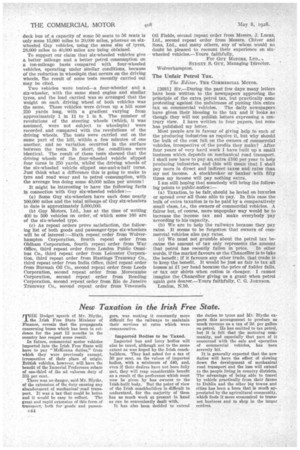New Taxation in the Irish Free State.
Page 72

If you've noticed an error in this article please click here to report it so we can fix it.
MHE Budget speech of Mr. Blythe, the Irish Free State Minister of Finance, reveals that the propaganda concerning buses which has been in evidence for the past 12 months in the country has reaped some result.
In future, commercial motor vehicles imported into the Irish Free State will have to pay "McKenna duties," from which they were previously exempt, irrespective of their place of origin. British vehicles, however; will have the benefit of the Imperial Preference rebate of one-third of the ad valorem duty of 331 per cent.
There was no danger, said Mr. Blythe. of the extension of the duty causing any abandonment of mechMticat road transport It was a tax that could be borne and it would be easy to collect The great and rapid extension of this form of transport, both for goods and passen
c44
gars, was making it constantly more difficult for the railways to maintain their services at rates which were remunerative.
Imported Bodies to be Taxed.
Imported bus and lorry bodies will also be taxed, although not to the same extent as was hoped by the Irish coachbuilders. They had asked for a Mx of 50 per cent, on the values of imported bodies, with a minimum of £40, and, even if their desires have not been fully met, they will reap considerable benefit as a result of the preference which must now be given by bus owners to, the Irish-built body. But the point of view of the Irish coachbuilders is difficult to understand, for the majority of them has as much work at present in hand as can be conveniently dealt with.
It has also been decided to extend
the duties to tyres and Mr. Blythe expects this arrangement to produce as much revenue as a tax of 2d. per gallon on petrol. He has omitted to tax petrol, but it is felt that the motoring community, and especially that part of it concerned with the sale and operation of commercial vehicles, has been severely hit.
It is generally expected that the new duties will have the effect of slowing down the development of mechanical road transport and the loss will extend to the people living in country districts. The advantage of being able to travel by vehicle practically from their farms to Dublin and the other big towns and cities has been a boon that is much appreciated by the agricultural community, which finds it more economical to transact business and to shop in the larger centres.
























































































































